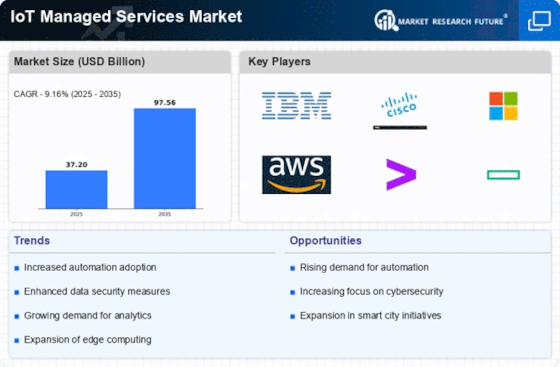Market Trends
Key Emerging Trends in the IoT Managed Services Market
The Internet of Things (IoT) Managed Services market is witnessing significant trends as businesses increasingly leverage IoT technologies for operational efficiency and innovation. One notable trend is the growing adoption of IoT across diverse industries. Organizations are realizing the potential of IoT to streamline processes, enhance decision-making, and drive digital transformation. This widespread adoption is fueling the demand for IoT Managed Services, as businesses seek external expertise to manage the complexities of IoT implementation, maintenance, and security.
Security concerns are at the forefront of IoT discussions, leading to an increased focus on IoT security services within the managed services market. As the number of connected devices continues to rise, the potential vulnerabilities also increase. IoT Managed Services providers are offering comprehensive security solutions, including threat detection, encryption, and access controls, to safeguard IoT ecosystems from cyber threats. This trend is crucial for building trust among businesses and consumers as they embrace the benefits of interconnected devices.
The complexity of managing diverse IoT devices and platforms has led to the emergence of platform-agnostic IoT Managed Services. Businesses often deploy a mix of IoT devices and platforms from different vendors, and managing this heterogeneous environment can be challenging. Platform-agnostic services provide a unified management approach, allowing organizations to efficiently oversee their entire IoT infrastructure regardless of the underlying technology, fostering interoperability and flexibility.
Edge computing is playing a pivotal role in shaping the IoT Managed Services market. With the increasing volume of data generated by IoT devices, processing and analyzing this data at the edge—closer to the source of data generation—has become essential for real-time decision-making. IoT Managed Services are adapting to this trend by offering edge computing capabilities, enabling organizations to derive actionable insights without overwhelming their central cloud infrastructure.
Scalability is a key consideration in the IoT Managed Services market as businesses aim to accommodate the growth of their IoT deployments. Service providers are offering scalable solutions that can adapt to the increasing number of connected devices and the expansion of IoT applications within an organization. This scalability is crucial for businesses looking to future-proof their IoT investments and ensure seamless integration as their IoT ecosystems evolve.
The integration of artificial intelligence (AI) and machine learning (ML) into IoT Managed Services is enhancing the capabilities of these services. AI and ML technologies enable predictive analytics, anomaly detection, and automation, allowing organizations to extract valuable insights from IoT data. This trend is particularly relevant for industries such as manufacturing, healthcare, and logistics, where predictive maintenance, operational efficiency, and data-driven decision-making are paramount.
Data privacy and compliance with regulations are becoming critical considerations in the IoT Managed Services market. As IoT generates vast amounts of sensitive data, organizations are seeking managed services that prioritize data privacy and adhere to regulatory requirements. Service providers are implementing robust data protection measures and ensuring compliance with data privacy regulations, providing businesses with the assurance that their IoT deployments are secure and compliant.


















Leave a Comment